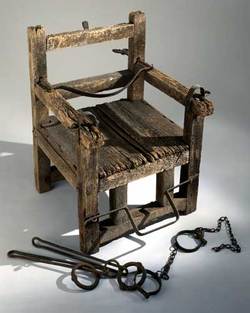 A 17th-century English ducking stool.
A 17th-century English ducking stool.(Photo courtesy The Colonial
Williamsburg Foundation Collection)
I first learned about ducking while reading The Taming of the Shrew in a Shakespeare class. It’s a punishment in which a woman accused of being a scold or a shrew was lowered into a body of water on a chair attached to a type of long lever—a ducking stool. The Encyclopaedia Britannica states that some of the ducking stool’s victims died during their punishments. It’s a cruel penalty for something we might consider annoying—but certainly not criminal—today. The Taming of the Shrew appeared in print in the early 1600s; was the practice of ducking really still used as late as 1829? I resolved to find out.
 Rebecca Mast
Rebecca Mast(Madison, Alabama)
So ducking did happen in the American colonies during the 1600s, but did the practice manage to outstay the British rule that brought it here?
A quick online search led me to a legal reference website called www.Duhaime.org, which informed me that the last known use of a ducking stool in England, where the punishment seems to have originated, was in 1807. However, evidence of ducking in the United States was a bit harder to find, and I had trouble discerning whether ducking stools were still in use by 1832.
Funnily enough, it seems that the folks involved in the court case about the woman I read about had trouble deciding that, too. A report of United States v. Royall shows that the woman’s counsel made a lengthy argument using resources like Jacob’s Law Dictionary to show that the ducking stool was the only form of punishment that the common law prescribed for scolds. He then went on to argue that ducking was obsolete in its country of origin, had never been used in Maryland (whose common law was used to frame the indictment), and was an unusual punishment and therefore forbidden by Maryland’s bill of rights. Because the only punishment was obsolete and illegal, the defense argued, the judgment should be arrested.
In short, the court determined that ducking was, indeed, an obsolete punishment, and the woman evaded an unpleasant and dangerous sentence. Unfortunately, it was determined that it was still a crime to be a scold, so another punishment was arranged for her.
So it seems that ducking was not a common practice in the United States by 1829, which is a relief. But who was this woman and what did she do to make people suggest such a medieval punishment for herself? Check out a future issue of Alabama Heritage to find out.
Rebecca Mast is a senior at the University of Alabama. She is an English major, minoring in creative writing and French. When she’s not searching through fascinating historical records, she enjoys reading, drawing, and playing clarinet with the Million Dollar Band.
References:
Reports of Cases Civil and Criminal: In the United States Circuit Court of the District of Columbia, from 1801 to 1841, Volume 3 by William Cranch , Little, Brown and Company, 1852
Duhaime: http://www.duhaime.org
Colonial Williamsburg Foundation: http://www.history.org
Encyclopaedia Britannica: http://www.britannica.com
 RSS Feed
RSS Feed